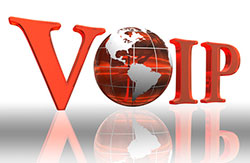 VOIP is an acronym that stands for voice over Internet Protocol. It's a technology used to deliver multimedia and voice communications over Internet Protocol (IP) networks like the internet. Most people are familiar with it in terms of its use to place phone calls over the internet rather than the Public Switched Telephone Network (PSTN). While the PSTN is circuit switched, VOIP is packet switched. This means that voice information travels across the internet in many packets of data. VOIP uses compression technology to reduce the size of packets to make transmission more efficient. VOIP is used by consumers and businesses and the technology has advantages and disadvantages.
VOIP is an acronym that stands for voice over Internet Protocol. It's a technology used to deliver multimedia and voice communications over Internet Protocol (IP) networks like the internet. Most people are familiar with it in terms of its use to place phone calls over the internet rather than the Public Switched Telephone Network (PSTN). While the PSTN is circuit switched, VOIP is packet switched. This means that voice information travels across the internet in many packets of data. VOIP uses compression technology to reduce the size of packets to make transmission more efficient. VOIP is used by consumers and businesses and the technology has advantages and disadvantages.
Consumers use VOIP applications like Skype to make phone calls between two computers and to regular phones. Over the years, VOIP has seen increasing use in the consumer market for home telephone service rather than the PSTN. VOIP has also seen wide adoption by businesses to meet their telephony needs. Corporate PBX lines are increasingly using VOIP as are Interactive Voice Response Systems (IVR) used in call center environments. There are several pros and cons taken into consideration by consumers and businesses when deciding whether or not to switch to VOIP.
The biggest single advantage is cost. Since VOIP is using the internet as backbone, often the only cost involved is the monthly cost of an ISP. International calls using VOIP also tend to be much cheaper. The V in VOIP may stand for voice but the fact of the matter is that VOIP does much more than just voice. Images, video and text can be transmitted using VOIP which can make it ideal for business applications like video teleconferencing or long distance collaboration. One potential disadvantage to VOIP is quality of service. VOIP service is only as good as the internet connection that it's running on top of. For this reason, voice quality can suffer due to latency. VOIP also is dependent on the power grid. The routers and modems that connect to the internet and that the VOIP service run on top of need a constant supply of power. No power means no telephone service. Another important disadvantage is that VOIP providers are not bound by regulations to offer emergency calls. However, many providers are making an effort to provide emergency calls.
It's a technology that continues to evolve and grow in its adoption by consumers and businesses.




